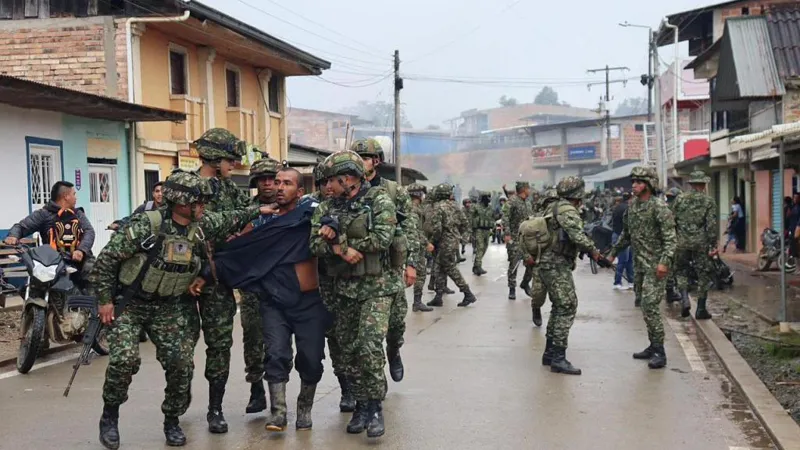FG should end herdsmen attacks now

Emboldened by the absence of a determined push-back from the federal security forces, armed Fulani herdsmen and militants are carving a blood-soaked path across the country. From the North-Central, Southern Kaduna in the North-West, and Taraba in the North-East, they have stepped up their rapine in the South-East and South-South and raised the stakes in the kidnapping-for-ransom ‘business’ in the South-West. The upsurge in herdsmen impunity is one of the negative enduring features of the regime of the President, Major General Muhammadu Buhari (retd.). In the five months left for him to quit office, he should mobilise the full coercive powers of the state to halt the criminality.
The herdsmen/militias are shedding innocent blood and destroying property across Nigeria. They are also raking in hundreds of millions of naira in ransom from kidnapping. Ubiquitous, they occupy the forests from where they emerge, cause mayhem, and thereafter retreat to. Their bloody enterprise started decades ago, but on Buhari’s watch, they have multiplied in number, frequency of attacks and impunity.
In Enugu State in December, several residents died in Ebor, Eha-Amufu community in Isi-Uzo Local Government Area, when armed herdsmen invaded the community. Residents said 10 bodies were recovered from the farms, among them,those of an aged couple who were kidnapped and their mutilated bodies found two weeks later.
Another attack in Ebor and Umjiovu communities claimed 25 lives according to the residents, though the Enugu State Police Command confirmed only four persons killed.
The PUNCH reported that since January 5, 2021, no fewer than 120 people were killed in four communities in Eha-Amufu by suspected herdsmen and their collaborators from the Agala community in Benue State.
In Ondo State, the Ijagba, Imoru and Arimogija communities in Ose LGA raised the alarm over the incessant attacks by suspected herdsmen who perpetrated killings and destroyed farms and crops.
Through 2022, there were repeated attacks on communities in Edo and Delta states with farms and crops destroyed, many persons kidnapped, and women raped. In the South-West, attacks on farms have resumed and kidnapping has resurged, reaching the Lagos-Ibadan Expressway, where suspected Fulani gunmen snatch victims, and flee with them into the forests.
Communities in the North-Central, southern Kaduna, and Taraba are under siege.Hardly a day passes without attacks, arson, and massacres in many farming communities. By mid-2022, the Benue State Emergency Management Agency said 1.5 million persons had been displaced from their homes and scattered in 27 Internally Displaced Persons camps – seven official and 20 unofficial – across the state.
The Southern Kaduna Peoples Union alleged that in the six years to April 2022, 148 communities were destroyed by rampaging Fulani gunmen and 200,000 natives displaced. The state government acknowledged that January to June 2022, 645 persons were killed in communal and revenge attacks, and by bandits.
In June 2022, a Taraba State lawmaker, Habila Anderifun, lamented that suspected Fulani herdsmen had killed at least 60 persons and displaced thousands of others following several attacks on communities in Ussa, Takum and Yangtu.
Indigenes claimed in 2021 that 102 Plateau State communities had been violently seized and occupied by militiamen and the residents evicted.
The situation demands drastic measures. A paper uploaded by the Social Science Research Network repository, declared, “The activities of herdsmen is a threat to economic, political and social security and a major factor associated with underdevelopment; it discourages both local and foreign investments, reduces the quality of life, destroys human and social capital, damages relationship between citizens and the state, thus undermining democracy, and the rule of law.”
Unfortunately, the Fulani rapine has been politicised; Buhari, key regime and state functionaries and the security agencies have been partisan. There can be no effective solution until insecurity is de-politicised.
Federal and state authorities need to accurately diagnose the root causes and dynamics of the problem. Buhari and the northern elite miss it when they attribute it solely to the contest for land between herders and farmers. True, that contest is an age-long phenomenon witnessed everywhere as society transits from agrarian to modern production practices.
Some of the conflicts do happen as herders invade farms with their animals. The obvious solution of encouraging ranching and protecting landowners from destructive cows and herders is stoutly resisted by Buhari and the Northern elite. There have also been attacks by residents on herders and Fulani settlements in an endless game of reprisals. This too cannot be excused.
Emboldened by benign security response, the herders engage openly in violent land grabbing. They slaughter men, women, and children alike; they follow up massacres with more massacres when the bereaved families gather to bury their dead or in places of worship.
More dangerous are findings that the herders have formed alliances with terrorist groups; their links with Boko Haram, ISWAP and Ansaru have since been confirmed by Nigerian security officials. The government is losing control.
Buhari and the state governors should act decisively and neutralise the criminals. In July 2022, the Emir of Muri, Abbas Tafida, in response to the kidnappings, killings and attacks on Taraba communities, gave the miscreants a 30-day ultimatum to vacate the state’s forests. His revelation that they were invited to settle in the area from neighbouring countries confirmed the collusion of the elite in illegally settling foreign criminals in the country. They should be arrested, prosecuted, and thereafter expelled from the country.
State governors should establish state security agencies and enforce the anti-open grazing laws. Regional security agencies should be strengthened, well-equipped, well-armed and generously funded.They should involve community associations, youths, farmers, hunters, and pressure groups to help clear the forests.
There is no alternative to ranching; open grazing is outdated and disruptive.The federal and state governments should develop policies to attract private investment in ranching, food processing and packaging, and exports. In Brazil, soft loans are given to herders who embrace ranching. Climate-smart agriculture should also be promoted. The switch to, and heavy investment in cattle ranching, has catapulted Brazil to the world’s largest exporter of beef.
The police should stop the bloodletting.
-punch news







